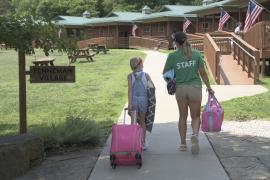Welcome back! In most camps, returning staff are an important part of a successful summer, bringing knowledge, perspective, and opportunities to broaden the camp experience for the campers. It's also an opportunity for you to grow in your own strengths and skills. While many successfully navigate the return to camp easily, you may also find that the transition to a new summer comes with some unexpected challenges. Here is a list compiled to help you recognize and avoid some common pitfalls:
It's a New Summer
When returning to camp, it's easy to become fixated on the memories and trying to re-create the intensity and emotions of last summer's camp love-bubble. Understandable. It was awesome and you want things to stay the same. However, in a people-growing venture like camp, avoiding change is totally unrealistic — and can lead to disappointment. Every summer is going to be different. Even when activities, schedules, and the dinner menu remain the same, there will always be new staff and campers — creating the need to establish new relationships. Every summer is also a new opportunity for a fresh start — for everyone (yourself included). Campers who experienced difficulty last summer may have grown out of who they were then and return as totally different individuals. Staff members will have matured and changed as well. Now is the time to embrace these growth opportunities.
Be Open to Change
Often, because your employment status is temporary, seasonal staff are not included in the decision making for the camp's business operations. In this situation, the change itself is typically not the problem; resistance to change is. Returning seasonal staff may feel there wasn't a need for the change or believe the change will make their jobs harder or will fail. Returning staff may flatly disagree with camp management — especially if the change affects something staff consider "sacred" such as a camp tradition or key staffing. This resistance, however, is often because of a lack of understanding for the bigger picture of the camp's business operations. Odds are you don't have all of the information. And, while you may feel emotionally invested in your camp, it's probably not your decision to make. When change happens, rest assured that business decisions have been well thought out by the administration, owners, or board. The summer is short. Spend your energy figuring out how to best support the changes and work to ensure you contribute to the camp in a positive and productive manner.
Old Staff, New Staff
Those who have worked at camp before should make an effort to welcome and include those who have not. It's understood you have relationships with friends from the past summer(s) and want to spend time reminiscing and hanging out. But it's equally important to be intentional in including and forming relationships with the staff who are new this season. Strong camp staffs are dependent on how well employees get along, interact with each other, and participate in a team environment. You know from past camp experience, if you don't work together as a team, everything around you will fall to pieces. The new staff are going to be part of your team this season, so start engaging now. (And, if many of your conversations are starting with some version of "So this one time last summer . . . ," you may want to rein that in. Just like your noncamp friends back home can't always relate to your camp stories, neither can the new staff.)
Be the Mentor They Want You to Be
Be the mentor you wish you had when you were a first-time staff member. Now is your chance. You understand the struggle. You know what's important. You've had success in motivating campers or resolving problems. You've figured out the schedule and know the really good games and the best shortcut to the lake on a hot day. Your good advice can be enormously valuable for new staff. Your willingness and openness to help others will go a long way in ensuring a successful summer for everyone.
Be Open to What You Don't Know
The knowledge gained from past camp experience is valuable indeed. However, just because you worked at camp before doesn't mean you know everything there is to know. Pay close attention to staff training — yes, again — this season, including the topics you have heard before. Keep in mind, your takeaways will be different this time because you have an experienced-based perspective on how the information may be applied.
Look at staff training as an opportunity to add new tools to your toolbox. Recognize that the specific needs, challenges, issues, cultures, and outcomes for each camper and/or group is going to be unique this summer. Campers' needs and issues aren't cookie-cutter. Even with experience, it is impossible to predict what will happen with every camper you serve. The same game, or game plan, that worked last summer is not going to work all the time.
As such, you need to be prepared with new/different strategies, understanding, activities, etc. (And let's get real, you can never have enough knowledge on topics around managing camper behavior.) Plus, you can share your perspective on what worked and what didn't and ask better situational questions this time around. As they say, knowledge is power.
Avoiding the Know-It-All Attitude
This phenomenon refers to returning staff who come back to camp with an attitude usually stemming from an inflated belief that because they are returning staff, they can skate by on prior experience and self-proclaimed awesomeness. But rather than really being awesome, their behavior is more I-know-it-all-because-Iam- returning-staff obnoxious — and they are often perceived as uncooperative and arrogant. Confident that camp administration loves returning staff (and would never fire them), these staff may believe in a mythical "gray area" that allows them to coast. So, as they already sat through staff training last summer, they shouldn't have to pay attention this summer or sing the camp songs or be on time or participate in activities — and the rules don't exactly apply to them.
The reality, however, is that returning staff are not indispensable. If you should happen to fall into this category, know that you will not be excused from performing at the appropriate standard. In fact, it's not unusual for directors to set the performance bar a bit higher for returning staff. One of the reasons staff are typically asked to return is because they are remarkable in their past performance. Camp leadership believed in you enough to bring you back, so they expect greatness. At the end of the day, loyalty to the camp doesn't replace performance at the camp.
Remember What You Were Hired to Do
It's easy to get caught up in the social scene at camp, especially when you have strong relationships with your coworkers. However, when social engagements become the focus or a distraction to the point of causing your work to suffer, it is a real problem. In other words, if your behavior is causing your supervisor to wonder if you returned to hang out with your friends or if you are truly here to do your job, you need to quickly change your priorities.
Supervising activities or caring for other people's children requires that you are mentally and emotionally "in it," ready to give fully of yourself in mind, body, heart, and spirit. Remember that you are here for the benefit of the camp, not the other way around. If your social activities are impacting your ability to perform your job duties, odds are you won't have those duties for long.
|
Signs You May Be Headed for Trouble
If you are concerned that you may be falling into some of these detrimental habits, seek out a mentor of your own at camp who can help keep you accountable for maintaining the high standards expected of you. |
Diane Tyrrell, CCD, has over 25 years of professional experience working within the camp, youth development, and education fields with for-profit and nonprofit camps and organizations. Diane is the owner and director of Chef Camp, a residential culinary immersion program for teens, and CEO of Frog Pond Consulting, providing integrated solutions to help meet ever-changing marketplace challenges for universities, private schools, camps, recreational facilities, and nonprofit organizations. She can be reached at dianettyrrell@gmail.com.
Photo courtesy of Interlochen Arts Camp, Interlochen, Michigan.


